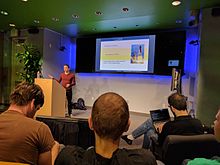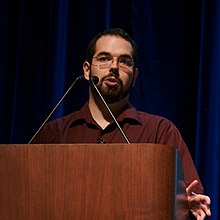기계지능연구소
Machine Intelligence Research Institute | |
| 형성 | 전 |
|---|---|
| 유형 | 비영리 단체 연구소 |
| 목적 | 친근한 인공지능과 AI 제어 문제 연구 |
| 위치 | |
주요 인물 | 엘리에저 유도코프스키 |
| 웹 사이트 | intelligence |
MIRI(Machine Intelligence Research Institute, MIRI)는 2005년부터 인공지능으로 인한 잠재적 존재 위험을 파악하고 관리하는 데 초점을 맞춘 비영리 연구소입니다.MIRI의 작업은 시스템 설계에 대한 우호적인 AI 접근과 기술 발전률 예측에 초점을 맞추고 있다.
역사
2000년, Eliezer Yudkowsky는 인공지능(AI)[1][2][3]의 개발을 가속화하기 위해 Brian과 Sabine Atkins의 자금으로 Singularity Institute for 인공지능을 설립했습니다.그러나, Yudkowsky는 미래에 개발된 AI 시스템이 초지능화 [1]되어 인류에 위험을 초래할 수 있다는 것을 우려하기 시작했고, 2005년에 연구소는 실리콘 밸리로 이전하여 당시 이 [2]분야 과학자들에 의해 대부분 무시되었던 위험들을 식별하고 관리하는 방법에 초점을 맞추기 시작했다.
2006년부터는 스탠포드 대학과 협력하고 피터 티엘의 자금 지원을 받아 AI의 위험성을 포함한 미래를 논의하기 위해 싱귤러리티 서밋을 조직했다.샌프란시스코 크로니클은 첫 컨퍼런스를 "트랜스 휴머니즘이라고 불리는 [4][5]기술에서 영감을 받은 철학을 위한 베이 에리어 커밍아웃 파티"라고 표현했다.2011년에는 [6]버클리 시내에 있는 아파트 4채였다.2012년 12월, 연구소는 이름, 웹 도메인 및 Singularity Summit을 Singularity [7]University에 매각하고, 그 다음 달에 "Machine Intelligence Research Institute"[8]라는 이름을 얻었습니다.
2014년과 2015년에는 AI의 위험에 대한 대중적, 과학적 관심이 높아지면서 MIRI 및 이와 유사한 기관의 [3][9]: 327 연구 기금 기부가 증가하였다.
2019년에 Open Pilitropy는 MIRI에 [10]2년간 약 210만 달러의 일반 지원 보조금을 권고했다.2020년 4월, Open Pilitropy는 이를 2년에 [11][12]걸쳐 770만 달러의 조성금으로 보완했습니다.
2021년 비탈릭 부테린은 수백만 달러 상당의 Etherinum을 [13]MIRI에 기증했다.
조사 및 접근법

Yudkowsky가 이끄는 MIRI의 AI 위험 식별 및 관리 접근방식은 주로 AI 시스템의 초기 설계와 진화하는 AI 시스템이 [3][14][15]우호적인 상태를 유지하도록 보장하는 메커니즘의 창조를 모두 망라하여 친근한 AI를 설계하는 방법을 다룬다.
MIRI 연구원들은 예방책으로 [16]조기 안전 작업을 옹호한다.그러나 MIRI 연구원들은 레이 커즈와일과 같은 특이성 지지자들의 초지능이 "코앞에 다가왔다"[14]는 견해에 대해 회의적인 반응을 보였다.MIRI는 불연속적인 기술 변화의 역사적 사례를 연구하는 AI Impacts라는 이니셔티브를 통해 예측 작업에 자금을 지원하고 인간과 [17]컴퓨터 하드웨어의 상대적 계산 능력에 대한 새로운 척도를 개발했습니다.
MIRI는 효과적인 이타주의 [18]운동의 원칙과 목표에 부합한다.
MIRI 스탭에 의한 작업
- Graves, Matthew (8 November 2017). "Why We Should Be Concerned About Artificial Superintelligence". Skeptic. The Skeptics Society. Retrieved 28 July 2018.
- LaVictoire, Patrick; Fallenstein, Benja; Yudkowsky, Eliezer; Bárász, Mihály; Christiano, Paul; Herreshoff, Marcello (2014). "Program Equilibrium in the Prisoner's Dilemma via Löb's Theorem". Multiagent Interaction without Prior Coordination: Papers from the AAAI-14 Workshop. AAAI Publications.
- Soares, Nate; Levinstein, Benjamin A. (2017). "Cheating Death in Damascus" (PDF). Formal Epistemology Workshop (FEW). Retrieved 28 July 2018.
- Soares, Nate; Fallenstein, Benja; Yudkowsky, Eliezer; Armstrong, Stuart (2015). "Corrigibility". AAAI Workshops: Workshops at the Twenty-Ninth AAAI Conference on Artificial Intelligence, Austin, TX, January 25–26, 2015. AAAI Publications.
- Soares, Nate; Fallenstein, Benja (2015). "Aligning Superintelligence with Human Interests: A Technical Research Agenda" (PDF). In Miller, James; Yampolskiy, Roman; Armstrong, Stuart; et al. (eds.). The Technological Singularity: Managing the Journey. Springer.
- Yudkowsky, Eliezer (2008). "Artificial Intelligence as a Positive and Negative Factor in Global Risk" (PDF). In Bostrom, Nick; Ćirković, Milan (eds.). Global Catastrophic Risks. Oxford University Press. ISBN 978-0199606504.
- Taylor, Jessica (2016). "Quantilizers: A Safer Alternative to Maximizers for Limited Optimization". Workshops at the Thirtieth AAAI Conference on Artificial Intelligence.
- Yudkowsky, Eliezer (2011). "Complex Value Systems in Friendly AI" (PDF). Artificial General Intelligence: 4th International Conference, AGI 2011, Mountain View, CA, USA, August 3–6, 2011. Berlin: Springer.
「 」를 참조해 주세요.
레퍼런스
- ^ a b "MIRI: Artificial Intelligence: The Danger of Good Intentions - Future of Life Institute". Future of Life Institute. 11 October 2015. Archived from the original on 28 August 2018. Retrieved 28 August 2018.
- ^ a b Khatchadourian, Raffi. "The Doomsday Invention". The New Yorker. Archived from the original on 2019-04-29. Retrieved 2018-08-28.
- ^ a b c Waters, Richard (31 October 2014). "Artificial intelligence: machine v man". Financial Times. Archived from the original on 27 August 2018. Retrieved 27 August 2018.
- ^ Abate, Tom (2006). "Smarter than thou?". San Francisco Chronicle. Archived from the original on 11 February 2011. Retrieved 12 October 2015.
- ^ Abate, Tom (2007). "Public meeting will re-examine future of artificial intelligence". San Francisco Chronicle. Archived from the original on 14 January 2016. Retrieved 12 October 2015.
- ^ Kaste, Martin (January 11, 2011). "The Singularity: Humanity's Last Invention?". All Things Considered, NPR. Archived from the original on August 28, 2018. Retrieved August 28, 2018.
- ^ "Press release: Singularity University Acquires the Singularity Summitt". Singularity University. 9 December 2012. Archived from the original on 27 April 2019. Retrieved 28 August 2018.
- ^ "Press release: We are now the "Machine Intelligence Research Institute" (MIRI) - Machine Intelligence Research Institute". Machine Intelligence Research Institute. 30 January 2013. Archived from the original on 23 September 2018. Retrieved 28 August 2018.
- ^ Tegmark, Max (2017). Life 3.0: Being Human in the Age of Artificial Intelligence. United States: Knopf. ISBN 978-1-101-94659-6.
- ^ "Machine Intelligence Research Institute — General Support (2019)". Open Philanthropy Project. 2019-03-29. Archived from the original on 2019-10-08. Retrieved 2019-10-08.
- ^ "Machine Intelligence Research Institute — General Support (2020)". Open Philanthropy Project. 10 March 2020. Archived from the original on April 13, 2020.
- ^ Bensinger, Rob (April 27, 2020). "MIRI's largest grant to date!". MIRI. Archived from the original on April 27, 2020. Retrieved April 27, 2020.
- ^ "Ethereum creator Vitalik Buterin donates $1.5 billion in cryptocurrency to India COVID Relief Fund & other charities". MSN.
- ^ a b LaFrance, Adrienne (2015). "Building Robots With Better Morals Than Humans". The Atlantic. Archived from the original on 19 August 2015. Retrieved 12 October 2015.
- ^ Russell, Stuart; Norvig, Peter (2009). Artificial Intelligence: A Modern Approach. Prentice Hall. ISBN 978-0-13-604259-4.
- ^ Sathian, Sanjena (4 January 2016). "The Most Important Philosophers of Our Time Reside in Silicon Valley". OZY. OZY. Archived from the original on 29 July 2018. Retrieved 28 July 2018.
- ^ Hsu, Jeremy (2015). "Making Sure AI's Rapid Rise Is No Surprise". Discover. Archived from the original on 12 October 2015. Retrieved 12 October 2015.
- ^ "AI and Effective Altruism". Machine Intelligence Research Institute. 2015-08-28. Archived from the original on 2019-10-08. Retrieved 2019-10-08.
추가 정보
- Russell, Stuart; Dewey, Daniel; Tegmark, Max (Winter 2015). "Research Priorities for Robust and Beneficial Artificial Intelligence". AI Magazine. 36 (4): 6. arXiv:1602.03506. Bibcode:2016arXiv160203506R.



